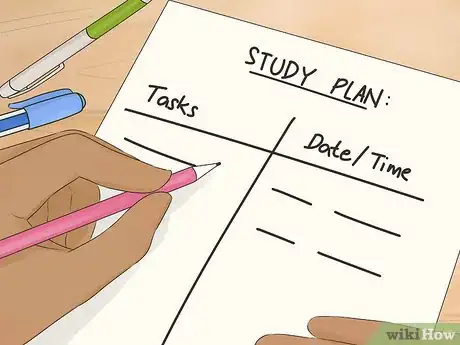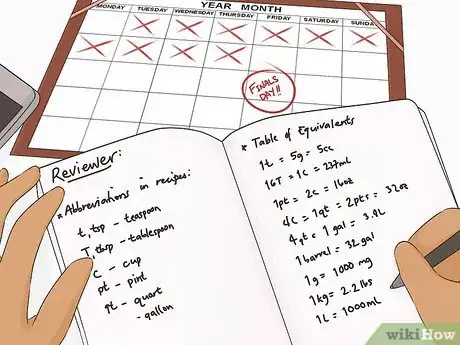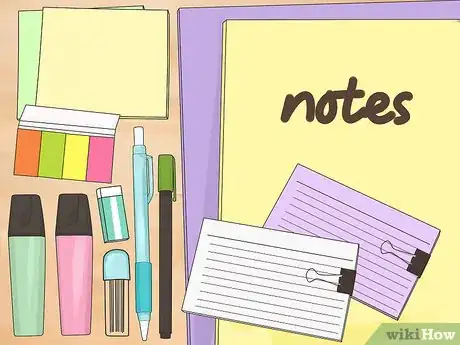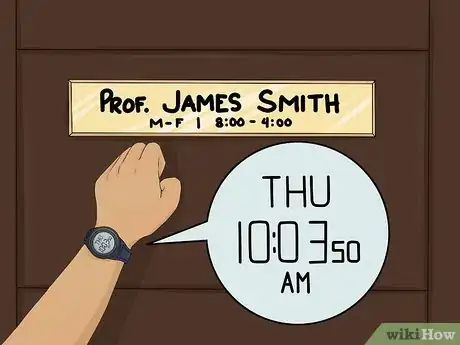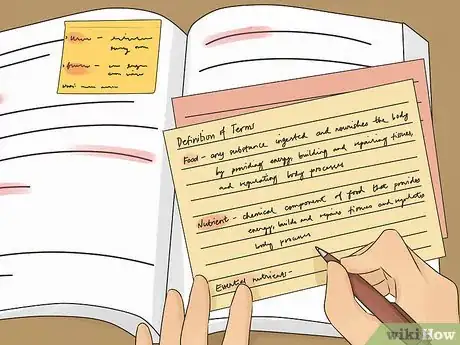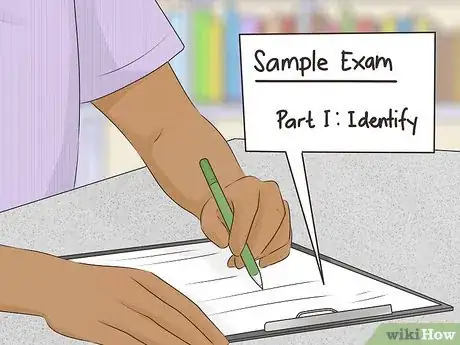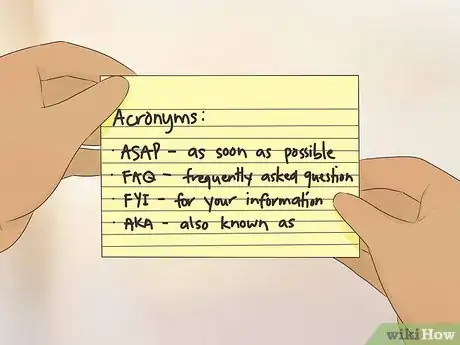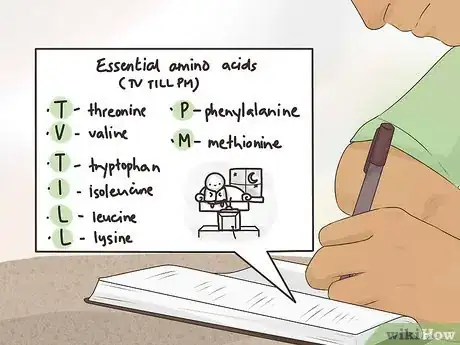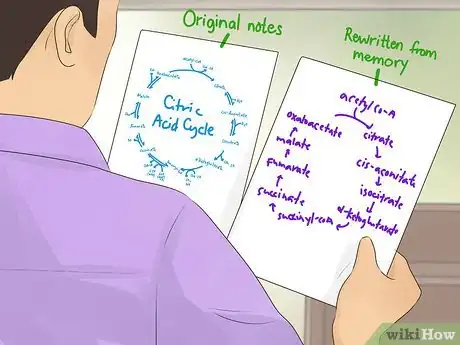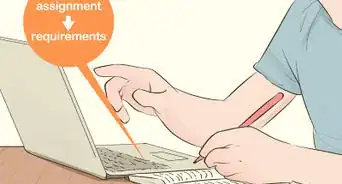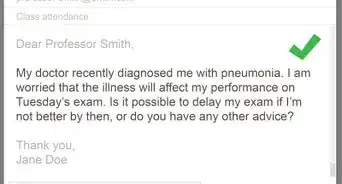This article was co-authored by Bryce Warwick, JD. Bryce Warwick is currently the President of Warwick Strategies, an organization based in the San Francisco Bay Area offering premium, personalized private tutoring for the GMAT, LSAT and GRE. Bryce has a JD from the George Washington University Law School.
There are 13 references cited in this article, which can be found at the bottom of the page.
wikiHow marks an article as reader-approved once it receives enough positive feedback. This article has 17 testimonials from our readers, earning it our reader-approved status.
This article has been viewed 213,001 times.
Studying for final exams can be a stressful period, especially if you're struggling to find the time or the willpower to put in the necessary work. However, managing stress while also achieving top notch grades is very doable if you can figure out study techniques and routines that work for you. Here are some suggestions that can help you to study both effectively and efficiently.
Steps
Preparing to Study
-
1Identify your goals. Before you begin studying, it is important to identify what your goals are. Set a target grade for each exam and think about what you will need to do to achieve that grade.[1]
- Be realistic; consider how well you've been doing all year, how good your understanding of the material is and window of time you have to study.
- Don't set your goals too low either. Try to push yourself and set your mind to achieving your full potential.
-
2Make a study plan. Making an effective and realistic study plan is a vital component of doing well in your finals. By planning out your study, you can ensure that you will have all the necessary materials covered by the time the exams roll around, thus minimizing stress and maximizing productivity. Here are some things you will need to consider:[2]
- Create a time chart of your current activities. Factor in classes, work, time spent with family and friends, etc. This will allow you to see how much free time you have available for study.
- Develop a study schedule that works with your timetable. Use time between classes, commute time and any other free time to slot in some extra study. Keep in mind that an hour of study every day will be more productive than a 5-hour block once a week.
- Determine your study goals. You shouldn't just write vague guidelines like "study biology" -- your study plan needs to be specific. Break down your study material into specific topics and tasks and fill these into your study schedule. Give 20-minute slots to small, bite-size chunks of information and commit to the idea that you will know that information inside out by the end of those 20 minutes.
- Stick to your schedule. A study schedule is no good if you don't stick to it. That's why it needs to be realistic. Factor in breaks and potential distractions when planning, so there will be no excuses when the time comes.[3] If it helps, think of the study schedule like a job. You have no option but to do it. Consider that studying for a certain subject might take longer than you thought, so put in some extra time into your schedule.
Advertisement -
3Begin studying well in advance. This may seem like a bit of a no-brainer, but the earlier you start studying, the more prepared you'll be come exam time. Starting early ensures that you will have time to cover all the necessary material, time to do practice exams and maybe even time to do some extra reading, which will give you an edge on the day. By beginning to study well in advance, you will also feel less stressed out and anxious and have more confidence in yourself.[4]
- Ideally, you should make studying part of your weekly routine throughout the school year, not just coming up to exams. You should prepare for classes by doing the required readings, along with some extra reading around the topic under discussion. Engage with your professors, ask questions about anything you don't understand and take extensive notes, as these will be an invaluable study tool later. After class, review the material and rewrite or type out the rough notes you took during class. This will help you to retain the information much better when it comes to exam time.
- Do not procrastinate. Everybody is guilty of procrastination at some point, but coming up to finals you should make a serious effort to avoid it. View your study schedule as being set in stone. By actually doing your study when you say you're going to do it, you minimize the risk of cramming the week or night before the exam. Tempting as it may be to put off study until the last possible moment, cramming so close to the exams is an ineffective way to study.[5] Cramming lowers the chances of you actually retaining any information and dramatically increases stress levels. So do not procrastinate!
-
4Gather your materials. Gather and organize all of the materials and resources necessary for you to ace your exams. Get together your class notes, old tests and assignments, class handouts, past exam papers and relevant textbooks.
- Use folders, highlighters and sticky notes to organize the material and make important information easily accessible.
- Read through your class notes and underline any key words, formulas, themes and concepts. Your class notes are a valuable study resource as they are more succinct than textbooks and will give you some clue as to what the professor is most likely to emphasize in the exam.
- Ask to borrow a classmate's notes to compare with your own if you feel there are gaps.
- Find some different textbooks from the ones you normally use. An alternative textbook may provide extra information that will make you stand out from the rest of the class, or it might phrase a definition in a way that enables you to fully understand it for the first time.
-
5Choose a quiet study location.[6] Choosing the right location is an important aspect of effective study. The ideal study location will differ from person to person. Some people might prefer to work at home, where they can grab a cup of coffee or a snack whenever they feel like it. Others prefer to work in a library, where they are surrounded by other focused individuals and have minimal distractions. You need to find what works for you. It may be a process of trial and error until you find the setting that works best for you, or you may find that a combination of different locations makes the process less monotonous and easier to stick to.[7]
-
6Go to office hours. Office hours are a service that most students are either too lazy or too afraid to avail of. However, most professors or T.A.'s are delighted to see students taking an interest and will be more than happy to answer any questions or address any concerns that you might have.
- Just by making the effort to go to office hours, you are giving the professor a favorable impression of yourself, which might influence their thinking when grading your exam.
- Discussing the course material with your professor may also give you some clue as to what he/she considers to be the most important topics on the course, and thus the most likely to come up in the exam. He or she may also be able to steer you in the right direction when it comes to exam technique and what they will be looking for in the exam.
-
7Organize a study group. Study groups can be a great idea for people who have trouble motivating themselves to study. Choose a group of people you like and work well with and organize a 2 or 3 hour study session once a week. In a group setting, you can can bounce ideas off other people, work through difficult problems together, and ask questions that you would be afraid to ask a professor. You may also be able to divide the workload between you.[8]
- For example, if you are studying from a textbook with long, complicated chapters from which only key information is needed, you could try taking a chapter each and summarizing its contents for everyone in the group. This way you can get through a lot of information in a relatively short space of time.
- When working in a study group, it is important that everyone in the group is at a similar level and has a similar work ethic. Otherwise the study group won't work, as one person may end up doing all the work, or another might be completely left behind.[9] Don't feel bad if you need to pull out of a study group that's not working for you. Doing well is what's most important.
Studying Efficiently
-
1Study in 20-50 minute blocks. If you try to study for long periods of time, you will tire easily and your studying will not be very effective. It's much better to study in short 20-50 minute bursts, as during this short space of time you will be able to concentrate fully, thus maximizing the amount of information you absorb.[10]
- After 20-50 minutes studying a particular topic, take a quick 5-10 minute break and then move on to another topic. This way you will stay fresh and won't get bored of the material.
- To use this method of studying, you will need to break down your study material into small, easily-digestible chunks. If you give yourself too much material to cover in such a short space of time you will not be able to learn the material properly.
-
2Take frequent breaks. The importance of taking frequent, short breaks cannot be underestimated. Taking a break allows your brain to process all of the information it has just absorbed and to refresh before beginning again. You should take 5-10 minute breaks between each 20-50 minute study session and a 30 minute break every four hours or so.
- Perusing social media sites or watching television is not the best use of your break time. You are better off using that time to eat a healthy snack to refuel your brain, as it consumes glucose while you study.[11] Almonds, fruit and yogurt are all good options.
- You should also take a short walk outside to get some fresh air. Oxygen stimulates blood flow, which helps keep the brain in top form. If you can't go outside, try doing some stretches to loosen up your limbs.
-
3Break up big sections into small, manageable tasks. Studying can seem like a very daunting prospect when you've set yourself the goal of learning an entire topic over the course of an extended study session. However, the task will be much more approachable if you break the topic into smaller sections, which can be tackled in small, intense bursts.[12]
- For example, if you are studying a Shakespearean text and you set yourself the goal of knowing "The Tempest" inside out by the end of the day, the task may seem insurmountable. But if you break your study up into specific tasks it will be much more approachable. Take 40 minutes to study the character of Caliban, another 40 to study the play's major themes, and another 40 to learn some of the most important quotes.
- Equally if you're studying a science subject such as biology, don't overwhelm yourself by trying to absorb an entire textbook chapter in one go. Break it up into small, easily-digestible pieces. Take 20 minutes to learn some key definitions, or to memorize an important diagram or experiment.
-
4Make effective notes. Making your own personalized notes is essential for effective studying. Well-structured, organized notes can help you to study much more efficiently, as consulting your own tailor-made notes is much quicker than trawling through a large textbook in search of specific information. By making your own notes, you can highlight essential information, while eliminating any superfluous material contained in textbooks.[13]
- When making notes, try to compile the most helpful, easy to understand information from a variety of textbooks, from professor's handouts and class notes. By varying your source material, you will produce notes that are broader in content. This will help you to stand out from your classmates during an exam and increase your chances of doing well.
- Try to find a method of making notes that works for you. Some students make flashcards, others use different colored pens when writing, while others use a shorthand. Do what feels right for you, just make sure the notes are legible and well-organized.
-
5Use textbooks strategically. Most college students are bombarded with textbooks, and reading is often a chore they've come to dread. However, reading your textbooks does not need to be as difficult or time-consuming as you think. The key is learning how to read the text more efficiently and effectively.
- Before you dive in and read the material in depth, take a minute to survey the material by briefly skimming through the chapters you plan on reading. Read the title of the chapter and look to see if there is an outline which summarizes the chapter's contents. Read any headings, subheadings or words in bold text. Have an idea about what you will be reading before jumping in.
- Ask yourself what the most important topics or concepts in the chapter are. You may find that turning each heading into a question is helpful. Develop questions like Who?, What?, When?, Where?, Why?, and How?, which you can answer while you read.
- Once you've become familiar with what the chapter is going to cover, it is time to start reading. Try to to recognize any important terms or concepts. It is also a good idea to underline or highlight any information you think is important and that you would like to revisit later.
- After you have finished reading the text, the next step is to recite the information you learned.Try to answer the questions you developed earlier without referring to the textbook in order to test whether you really absorbed the material. Once you feel you have a complete grasp of the material, repeat all the major topics and terms to yourself. Putting the concepts you read into your own words helps with memorization.
- Make notes about the information you just read, including any headings, definitions, key terms or anything else you consider important. While your notes should be brief, they should also be detailed enough to allow you to refresh your memory of the most important concepts when you're using them to study later.
- Now that you've read the material and taken notes, review everything you've learned. Browse your notes to recall the important topics that were covered in the chapter. Try to predict questions that your professor may put on an exam and practice how you would answer them. Make sure you have a strong understanding of what you just read. If you feel confused or do not understand a concept, go back and read over it again.[14]
-
6Explain the material to someone else. Once you feel that you have a good grasp of the material, ask a friend or family member if you can try explaining the material to them. If you can explain the material in a way that the other person (who hasn't studied the subject) can understand, without getting confused yourself, it is a pretty good indication that you know your topic well.
- By putting the information in your own words and talking through the topic without the aid of notes, you are helping to commit the knowledge to memory.
- Being able to explain it to someone else also proves that you actually understand the information you have learned, rather than just having learned it by rote.
-
7Test yourself. Once you have covered all of the material that is likely to come up in the final exam, you should consider doing some practice tests. Doing practice tests is an excellent way to test your knowledge and understanding of the material.
- Use end-of-term exams, class quizzes and past exam papers or ask your professor to provide a sample paper. Past exam or sample papers will also help you to feel comfortable with the structure and format of the exam, which can be invaluable come exam day.
- Don't worry if the practice test doesn't go as well as you'd hoped. The whole point of doing a practice test is to identify your weak areas, so you can go back and study them some more.
Studying Techniques
-
1Use image-word association. Image-word association works by relating an unknown term or concept to an image you are already familiar with. Associating the unfamiliar material with something you already know can help you to remember that material much more easily, especially if you are a very visual person. As a simple example, if you are trying to remember the term "dogma", try picturing a Golden Retriever every time you hear it![15]
-
2Use acronyms. An acronym is a word in which each individual letter stands for another word or term, making a list of words easier to remember. You can make your own acronyms by taking the first letter of a list of words or phrase and arranging them in such a way that they form another word that's easy to memorize. The best example of an acronym that is used in everyday speech is ASAP, which stands for "as soon as possible".
-
3Use mnemonic devices. A mnemonic device works in a similar way to an acronym, except it is used to remember a list of words in a particular order and is usually in the form of a phrase rather than a single word. The phrase can be anything, as long as the first letter of each word in the phrase correlates with the first letter of each word or term you are trying to remember, and that they are listed in the exact same order.[16]
- For example, some children use the phrase "Never Eat Soggy Worms" to remember the order in which directional terms appear on a compass. In this case, North = Never, East = Eat, South = Soggy, West = Worms.c
-
4Try the "hide-write-compare" technique. This method works similarly to explaining the subject you are studying to someone else, except it can be done on your own. After you have finished learning a particular subject and have written down all the relevant terms and definitions, try covering up your notes and rewriting everything by heart. When you are finished, look at your notes again and compare what your have written. If what you produced by heart is accurate, then you will know that you have a good grasp on the material.
- You probably used this method to learn how to spell your first words, by reading it, covering it up, then trying to write it out by yourself. Though it may simple, it is actually a very effective method of learning, even at college level.
-
5Try turning the material into a story. Instead of learning off boring, monotonous lists and facts, try turning your study material into an exciting and engaging story which you will easily be able to recall. Work descriptive facts, dates and locations, and certain key words into your story and write it down or recite it to yourself or others to commit it to memory.[17]
-
6Use analogies. Analogies work by comparing and contrasting terms and ideas in such a way as to make them easy to remember. Using analogies is all about recognizing patterns and how those patterns can apply to a variety of things. There are different types of analogy - such as those which relate parts to a whole. For instance, a battery is to flashlight what an engine is to a car. Alternatively, you can have analogies which examine cause and effect. For instance, itching is to scratching what smoking is to cancer.[18]
-
7Use repetition. Repetition is one of the most popular study methods. It involves going over information again and again - either through reading, writing or repeating aloud - until the information is fully absorbed. Repetition can be an effective study method, though it is usually necessary to test yourself to ensure that the information has actually been learned. You can read something a hundred times, but you still may not be able to reproduce what you read in an exam situation.[19]
-
8Determine when to use each method. While each of these methods has it merits, you will need to experiment a little to find a method which works for you. Also keep in mind that some methods work better for certain subjects than others - how you study math problems and formulas will be very different from how you study an English play.[20]
- For example, repetition, acronyms and mnemonic devices work best for science subjects like biology, which involve learning lots of unusual and unfamiliar terms, whereas storytelling can be very helpful when studying for a history exam, as you can turn the facts surrounding a certain figure or event into a compelling and memorable tale.
- Try to choose a study method based on your particular strengths. If you're a quick learner, reciting information and learning lists might come easily to you, whereas if you're a more visual person, associating written material with charts and pictures may help you to retain information more easily.
- Remember that there is no one, correct way to study - do whatever works best for you.
Managing Stress
-
1Eat healthy and get some exercise. The importance of healthy eating and exercise during intense periods of study cannot be understated. Eating right will give you more energy and help to keep you more alert during study sessions, while exercise can help you to clear your head and work out the stress.[21]
- Try to eat plenty of fresh fruit and veg, lean protein and filling, complex carbs at mealtimes, and try cereal and granola bars or a handful of nuts or raisins for healthy snacks. Avoid sugary snacks which will cause you to crash.
- In terms of exercise, try to incorporate 30 minutes of exercise into your daily routine, whether it's something fun like a dance class or football game, or something as simple as a walk outside.
-
2Get enough sleep. Aim to get a full 8 hour's of sleep every night while you are studying. It may be tempting to stay up late studying, but remember: you're going to need energy and focus in order to study effectively, which you won't have if you've stayed up late the night before. Also remember to get a proper night's sleep before the day of the exam. Your previous preparation can go to waste if you don't.
-
3Avoid stressful people. Stress can be extremely contagious, so try to avoid fellow students who are tearing their hair out over the exams, or people who are stressed-out generally. A calm, methodical approach to your work trumps stress every time.
-
4Say no to distractions. It can be easy to give in to distractions when studying, but try to remember your long-term goals and be firm with yourself. If you allow yourself to be distracted from studying now, you'll end up trying to cram the week before the exam, which will put your stress levels through the roof. Study in a disciplined and consistent manner and you'll feel much calmer and more prepared come exam time.
- While you're studying, turn off your phone and consider downloading a computer program that blocks your access to distracting websites, such as social media. If your friend asks you to go for coffee when you're in the middle of a productive study session, don't feel guilty about saying no.
-
5Have some fun. Set yourself a rigorous work schedule during the week and try to stick to it as closely as possible. However, you should allow yourself some free time at the weekend to relax and let your hair down. Go out with some friends, see a movie or just hang out with your family. If you've worked consistently during the week, there's no need to feel guilty about having some fun at the weekend... you'll need it!
-
6Visualize doing well. Try to visualize yourself feeling confident and relaxed on the day of the exam. Then think about what it would feel like to get your target test grades. Visualization will help motivate you to take the necessary steps to achieve your goals. Remember - if you believe you can do it, you can do it![22]
Expert Q&A
Did you know you can get expert answers for this article?
Unlock expert answers by supporting wikiHow
-
QuestionShould I study for my finals at the last minute?
 Bryce Warwick, JDBryce Warwick is currently the President of Warwick Strategies, an organization based in the San Francisco Bay Area offering premium, personalized private tutoring for the GMAT, LSAT and GRE. Bryce has a JD from the George Washington University Law School.
Bryce Warwick, JDBryce Warwick is currently the President of Warwick Strategies, an organization based in the San Francisco Bay Area offering premium, personalized private tutoring for the GMAT, LSAT and GRE. Bryce has a JD from the George Washington University Law School.
Test Prep Tutor, Warwick Strategies
-
QuestionHow do I study for exams within 1 day?
 Community AnswerAvoid distractions and use your time wisely. Erase all things connected to social medias and focus on studying. Studying for an exam within one day may be difficult, since there is more pressure for you. Just make sure not to stress yourself too much, because if you do you will be nervous and unsure on your test, which can cause you to forget things you studied.
Community AnswerAvoid distractions and use your time wisely. Erase all things connected to social medias and focus on studying. Studying for an exam within one day may be difficult, since there is more pressure for you. Just make sure not to stress yourself too much, because if you do you will be nervous and unsure on your test, which can cause you to forget things you studied. -
QuestionHow should I set my schedule so I can study for three exams in two weeks?
 Community AnswerIdentify your weaknesses. For example, if you're studying for History, Mathematics, and Science exams, think about which exam you need/want to do better in. Include factors such as the percentage of your final grade, weak areas, and interest. You will be much more inclined and motivated to study if you're studying something that you're interested in! Based on all of these factors, you can divvy up your time and study more effectively, since you only have two weeks.
Community AnswerIdentify your weaknesses. For example, if you're studying for History, Mathematics, and Science exams, think about which exam you need/want to do better in. Include factors such as the percentage of your final grade, weak areas, and interest. You will be much more inclined and motivated to study if you're studying something that you're interested in! Based on all of these factors, you can divvy up your time and study more effectively, since you only have two weeks.
References
- ↑ https://uwaterloo.ca/centre-for-teaching-excellence/teaching-resources/teaching-tips/tips-students/self-directed-learning/self-directed-learning-four-step-process
- ↑ https://www.sqa.org.uk/sqa/68908.html
- ↑ Bryce Warwick, JD. Test Prep Tutor, Warwick Strategies. Expert Interview. 5 November 2019.
- ↑ https://www.hercampus.com/school/uk/why-it-important-study-advance
- ↑ Bryce Warwick, JD. Test Prep Tutor, Warwick Strategies. Expert Interview. 5 November 2019.
- ↑ Bryce Warwick, JD. Test Prep Tutor, Warwick Strategies. Expert Interview. 5 November 2019.
- ↑ https://www.educationcorner.com/study-location.html
- ↑ https://eccles.utah.edu/news/5-tips-for-an-effective-study-group/
- ↑ Bryce Warwick, JD. Test Prep Tutor, Warwick Strategies. Expert Interview. 5 November 2019.
- ↑ https://learningcenter.unc.edu/tips-and-tools/studying-101-study-smarter-not-harder/
- ↑ http://www.teenvogue.com/advice/school-advice/2012-05/final-exams-study-tips
- ↑ https://news.uga.edu/break-large-tasks-down-into-smaller-more-manageable-pieces/
- ↑ https://www2.le.ac.uk/offices/ld/resources/dept/f-psyc/copy_of_notes
- ↑ http://www.howtostudy.com/read-text-slowly-before-and-after-class/
- ↑ http://www.howtostudy.com/study-smart-before-exams/
- ↑ http://www.howtostudy.com/study-smart-before-exams/
- ↑ http://www.howtostudy.com/study-smart-before-exams/
- ↑ http://www.howtostudy.com/study-smart-before-exams/
- ↑ http://www.howtostudy.com/study-smart-before-exams/
- ↑ http://www.howtostudy.com/study-smart-before-exams/
- ↑ http://www.upb.pitt.edu/uploadedfiles/final%20tips%20newsletter.pdf
- ↑ http://www.upb.pitt.edu/uploadedfiles/final%20tips%20newsletter.pdf
About This Article
To study for your finals, study your easy subjects first so you have more time for harder topics later. Try dividing up your time into blocks of 20-50 minutes and focusing on a single subject in each period. After you've completed a topic, take a 5-10 minute break to have a snack and take a walk outside as this will help your brain process what you've studied. If you have to deal with a big topic, such as a play, try breaking it up into manageable chunks. For example, you could take 40 minutes to study the main character and another 40 minutes to look at the play's key themes. For tips on how to manage stress while studying for your finals, read on!

